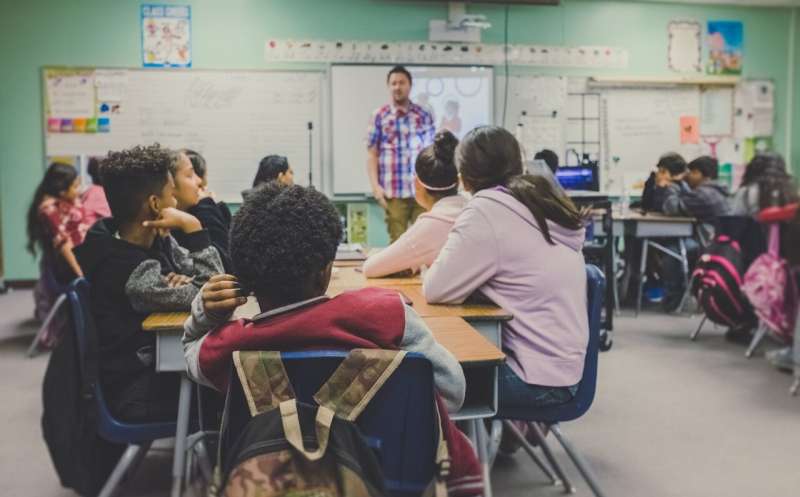Science
Researchers Advocate Conversational Learning as AI Transforms Education

The rise of artificial intelligence (AI) in education is prompting a shift towards more conversational learning methods, according to researchers from the University of Cambridge. In a conceptual paper published on November 17, 2025, the authors argue that traditional education models, which emphasize memorization, are increasingly outdated as technologies like chatbots enable students to bypass conventional learning methods.
The paper highlights concerns about the limitations of current educational assessments in the face of advanced AI capabilities. Rupert Wegerif, a professor of education at the University of Cambridge, and Dr. Imogen Casebourne, a researcher at the Digital Education Futures Initiative, emphasize the need for a “dialogic” approach to learning. This method involves increased interaction between teachers and students, encouraging collaborative problem-solving and exploration of ideas from multiple perspectives.
Rethinking Education in the Age of AI
Researchers suggest that AI can facilitate collaborative learning by allowing students to engage with various sources of knowledge. For instance, in a conventional lesson on gravity, students typically memorize definitions and formulas. In contrast, the researchers propose a dialogic approach where students begin with a fundamental question, such as “Why do objects fall to the ground?” This inquiry-based method encourages group discussions, which are then supplemented by interactions with an AI chatbot assuming the roles of influential thinkers like Aristotle, Newton, and Einstein.
The authors argue that such a framework positions students within significant scholarly dialogues relevant to their curriculum. This approach not only enhances understanding but also fosters critical thinking and reasoning skills.
Wegerif noted, “Every so often, a technology comes along that forces a rethink of how we teach. It happened with the internet, with blackboards—even with the development of writing. Now it’s happening with AI.” He cautioned that if tools like ChatGPT can pass existing exams, educators must reconsider what students are truly learning and how they are assessed.
Addressing Challenges and Opportunities
Despite guidance for UK schools on integrating AI, the paper warns against superficial strategies that merely apply technology to existing frameworks. For students struggling with assignments, the temptation to rely on AI for quick solutions could undermine their learning and development. Wegerif described this reliance on AI as “cognitive poison,” suggesting it limits student progress by allowing them to offload their thinking.
To counteract these challenges, the researchers advocate for a “double-dialogic pedagogy.” This involves first prioritizing dialogic teaching methods where students and teachers collaboratively tackle problems, with AI serving as a supportive resource. One example is ModeratorBot, an AI tool currently in development at Cambridge, designed to facilitate group discussions by encouraging diverse perspectives and moderating dominant voices.
The second aspect of this pedagogy involves using AI to introduce students to existing scholarly dialogues, allowing them to critically engage with various theories and thinkers. Tools like QReframer, developed by Simon Buckingham Shum, exemplify this approach by challenging students’ assumptions and promoting deeper critical reflection rather than simply providing answers.
The authors emphasize that integrating generative AI into education requires adapting teaching methods to become more conversational and collaborative. Dr. Casebourne stated, “Generative AI has arrived at a time when there are many other pressures on educational systems. The question is whether it is adopted in ways that enable students to develop skills such as dialogue and critical thinking or ways that undermine this.”
The researchers assert that engaging students in dialogues that illuminate diverse perspectives can better prepare them to tackle the complex global challenges known as the “polycrisis,” which includes issues like climate change and threats to democracy.
Wegerif concluded, “The way we teach and learn needs to change. AI can be part of the remedy, but only with approaches to learning and assessment that reward collaborative inquiry and collective reasoning. There is no point just teaching students to regurgitate knowledge. AI can already do that better than we can.”
In light of these insights, educational institutions are called upon to reconsider their approaches to teaching and assessment, ensuring they align with the evolving landscape shaped by AI advancements.
-

 Science2 weeks ago
Science2 weeks agoUniversity of Hawaiʻi Joins $25.6M AI Project to Monitor Disasters
-

 Business3 weeks ago
Business3 weeks agoForeign Inflows into Japan Stocks Surge to ¥1.34 Trillion
-

 Top Stories3 weeks ago
Top Stories3 weeks agoMarc Buoniconti’s Legacy: 40 Years Later, Lives Transformed
-

 Top Stories3 weeks ago
Top Stories3 weeks agoBOYNEXTDOOR’s Jaehyun Faces Backlash Amid BTS-TWICE Controversy
-

 Health4 weeks ago
Health4 weeks agoInnovative Surgery Restores Confidence for Breast Cancer Patients
-

 Sports1 month ago
Sports1 month agoSteve Kerr Supports Jonathan Kuminga After Ejection in Preseason Game
-

 Science1 month ago
Science1 month agoChicago’s Viral ‘Rat Hole’ Likely Created by Squirrel, Study Reveals
-

 Top Stories3 weeks ago
Top Stories3 weeks agoCarson Wentz Out for Season After Shoulder Surgery: Urgent Update
-

 Lifestyle1 month ago
Lifestyle1 month agoKelsea Ballerini Launches ‘Burn the Baggage’ Candle with Ranger Station
-

 Politics1 month ago
Politics1 month agoDallin H. Oaks Assumes Leadership of Latter-day Saints Church
-

 Entertainment1 month ago
Entertainment1 month agoZoe Saldana Advocates for James Cameron’s Avatar Documentary
-

 Lifestyle1 month ago
Lifestyle1 month agoDua Lipa Celebrates Passing GCSE Spanish During World Tour









